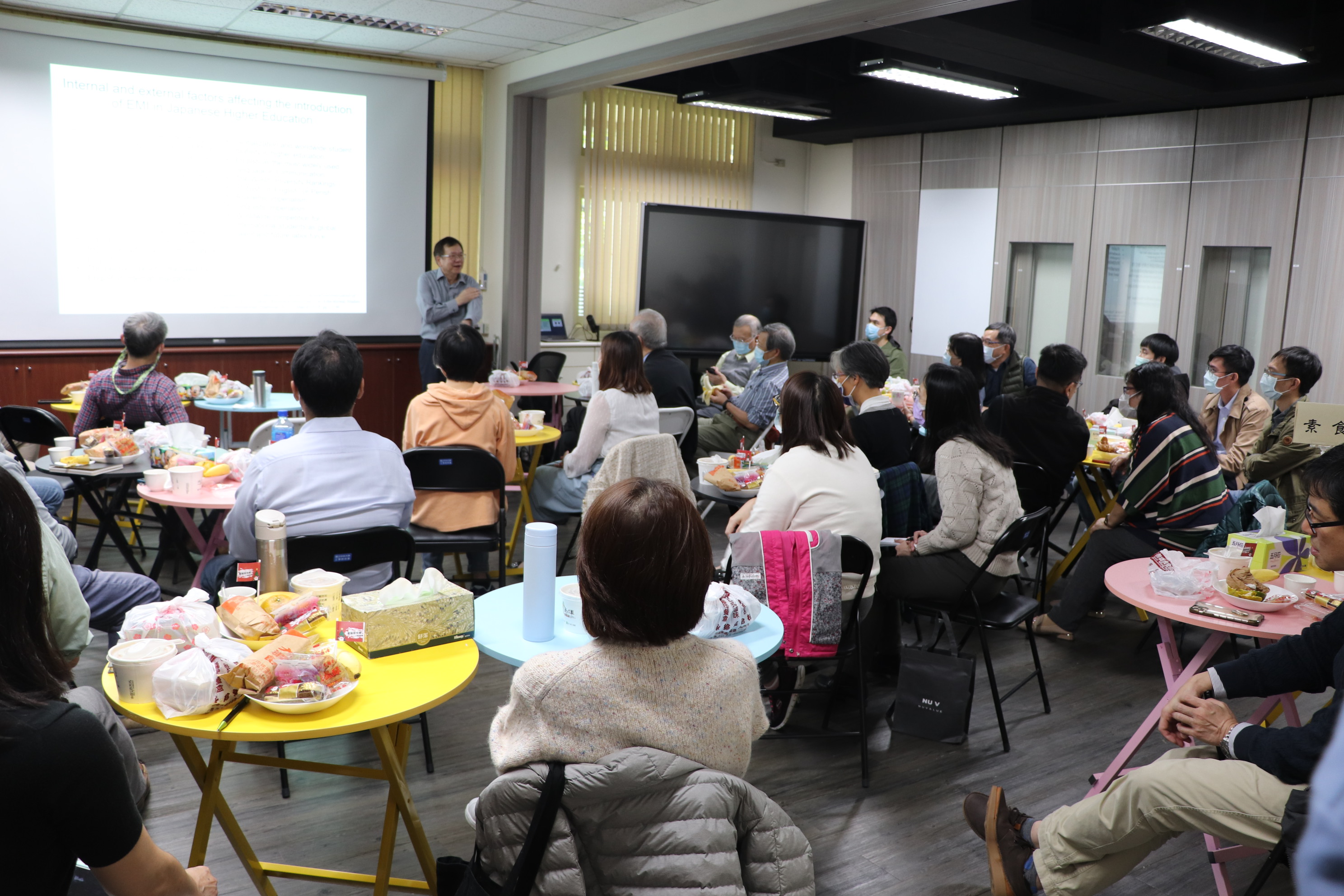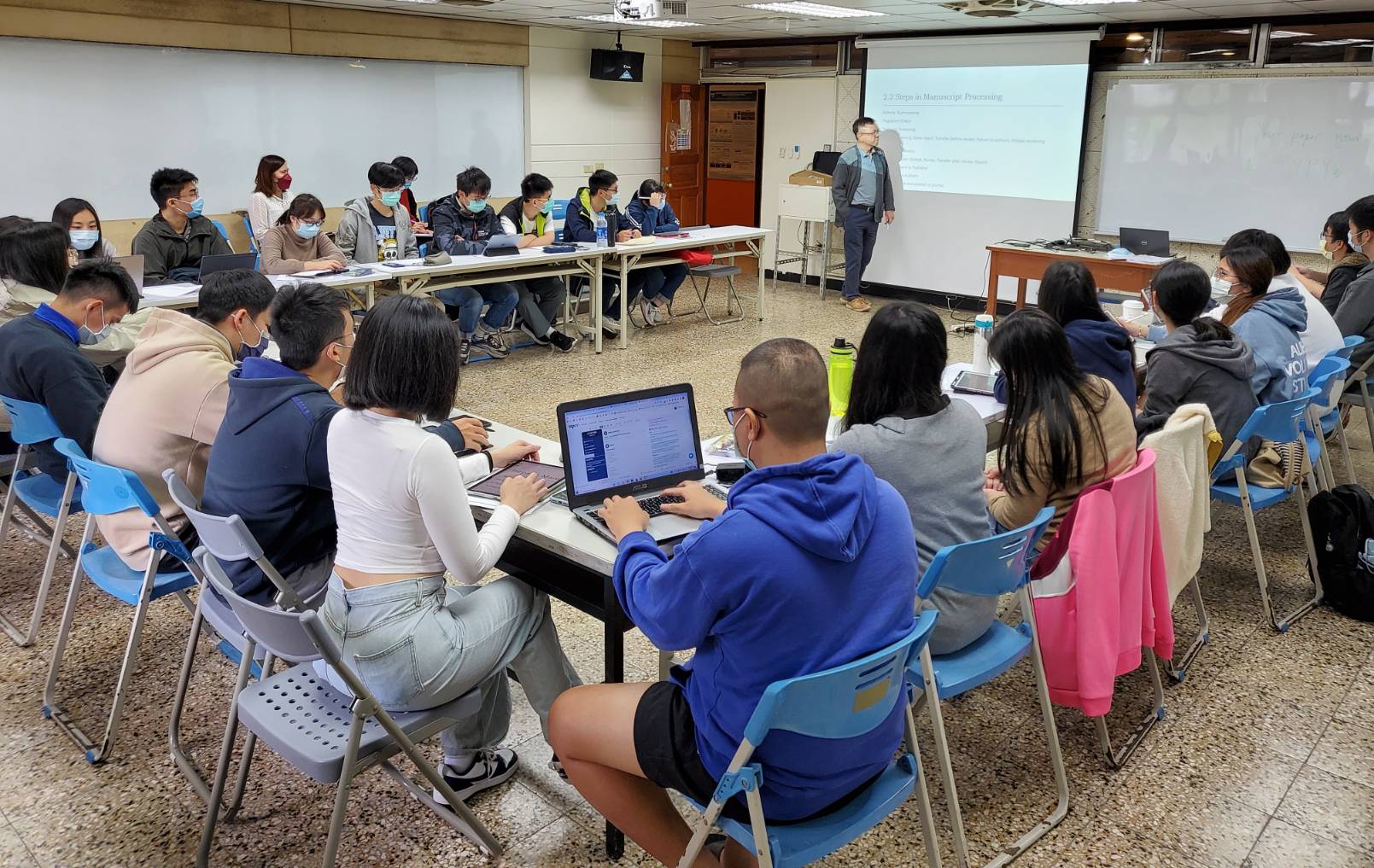Abstract
Implementation Summary of the Program on Bilingual Education for Students in National Central University College of Engineering
The College combines and leverages resources at the university and collegiate levels to promote bilingualism. The implementation overview for the 2021-2022 academic year is stated as follows.
Features of the program on bilingual education for students in National Central University
- Establishing a university-level "EMI Center": The center invited colleges and related administrative offices to a meeting on May 3, 2022 to gain administrative support and consensus on the promotion of the EMI program and to revise implementation strategies on a rolling basis in a hope to ensure the effectiveness and quality.
- Offering ongoing tailored EAP and ESP courses: The University’s EMI central unit divides the freshman English courses into different levels to consider the differences in students' English abilities and to maintain the learning quality. We have gradually included technical English contents and adjusted English courses to EAP/ESP courses as preparation for EMI courses.
- EMI Teaching Energy: The College provides EMI training and several seminars to improve the EMI teaching capacity. The EMI center also has assisted in sending two groups of 25 teachers to participate in the Cambridge Certificate in EMI Skills (Cambridge University Press & Assessment) training to heighten EMI teaching competence.
Features of the program on bilingual education for students in the College of Engineering
- Meeting with Steering Committee for Bilingual Education at the Collegiate level: We regularly discuss and exchange ideas in terms of organization, teachers, curriculum, students, and resource sharing to refine EMI promotion strategies, integrate various resources within the College, and track the performance of EMI promotion.
- Establishing EMI website: We provide a platform to improve the accessibility of EMI information for teachers and students. Relevant information is posted in different section, which contain a variety of resources such as EMI program introduction and online English self-study resources.
- Publishing news designated to EMI achievements: We actively promote the EMI series of activities. The implementation highlights are recorded and published on the EMI website. Information about EMI study and highlights are promoted to the public to enhance positive image.
- Distributing EMI course survey: The College distributed EMI course evaluation survey, which was separated into two versions. One version was for teachers, and the other one was for students. Students who took the survey had chances to receive prize.
- Diversified EMI courses: Teachers are encouraged to adapt EMI teaching strategies according to different subjects and different levels in order to take into account both students' professional knowledge absorption and English proficiency. In the 2021-2022 academic year, the total number of EMI courses is 122, and the percentage of students taking more than 20% of the credits in EMI courses in sophomore year and master's year is 31% and 70.9%. In the future, we will also develop certificates to encourage more students to participate in EMI courses.
For teachers:
- Developing "The Incentive Regulation of EMI courses of College of Engineering" to encourage teachers to offer EMI courses and create an English learning environment.
- The College is actively holding EMI seminars to broaden the horizons of EMI program and promote adoption of appropriate teaching modes for student characteristics. This enhances teachers’ ability in delivering EMI courses professionally and increases confidence and willingness to do such. The seminars were broadcasted on YouTube. Hosting seminars which are open to different universities and countries helps the College to share and learn EMI experiences from different perspectives.
- The College invited Prof. Sammy Lap Ip Chan from the Department of Chemical and Materials Engineering to hold EMI teaching experience sharing activities on November 30, 2021. In the seminar, EMI teaching ideas and techniques were exchanged to enable teachers to learn about diverse teaching methods and try out multiple teaching strategies.
- The College invited Prof. Tsong P. Perng of National Tsing Hua University on March 22, 2022 to share his EMI Experiences. Prof. Tsong P. Perng has been devoted to EMI teaching for many years. During the seminar, Prof. Tsong P. Perng shared the advantages and disadvantages of EMI teaching, provided his observation on MOOC s online learning and laboratory group discussions, and spoke on how Taiwanese universities stand in the world.
- The College invited Prof. Haydn H. D. Chen, one of the College’s Steering Committee members, to hold a seminar on May 3, 2022. The seminar introduced changes in the future workplace under a fast-changing generation. Prof. Chen used examples of educational transformation from world-renowned universities, such as MIT and Harvard University, to give us more insight into the higher education and to make us realize that the goal of university education is the training of both professional learning (hard skills) and liberal arts learning (soft skills) to cultivate students into "ideal graduates".
- On July 04, 2022, Prof. Sammy Lap Ip Chan was invited to hold a seminar about "How to Make the World Flat for you-Future Skills in a Competitive World", in which he talked about the international perspective, educational concepts and the positive and negative effects on the young generation under globalization. In the face of increasing competitive pressures, students need to invest more in themselves, improve their English skills, and cultivate diverse abilities to become irreplaceable talents.
- On July 13, 2022, we invited Prof. Sammy Lap Ip to hold a seminar on "From Learning English to Learning in English-Understanding the Challenges of Asian Students in EMI Courses" to share the importance of EMI in higher education in the future. He analyzed the challenges and strategies for teachers to teach in full English and for students to move from learning English to learning in English, and take the EMI experience in universities in Japan as an example to encourage every deliver the EMI course successfully.
- EMI teaching demonstration: The College had organized an EMI teaching demonstration activity on April 20, 2022 and invited Prof. Sammy Lap Ip Chan from the Department of Chemical and Materials Engineering to open his "Scientific Writing" course for teachers who are interested in observing the EMI course. Through experience sharing and teaching demonstration, teachers' professional EMI teaching skills are enhanced, confidence in using English to teach is built, and a shared learning culture is shaped to expand EMI teaching effectiveness.
In order to make the teaching demonstration smoother and more effective, the College made up a teaching demonstration manual, which contains the key points of EMI course observation, record writing skills, discussion ethics, etc., so that the teachers can observe classroom situations deeper in relation to EMI.
For students
- The College has developed a set of standards and incentives for students to improve their foreign language skills. The College also collaborates with the Language Center to offer an English-learning course. Successful completion officially certifies their active workplace English level and appreciably enhances their future employment prospects.
- The college holds the English Presentation Contest for Science & Technology, and the Capstone Project Presentation. Students are encouraged to present posters, presentations, and oral reports in full English and are rewarded with extra points for their work. Students are provided with the opportunity to learn from each other and to demonstrate the results of their projects in English.
- Student seminar: A student seminar was held on the 4th of November, 2021, with student representatives from each department encouraging students to increase participation in bilingual activities, spread awareness of the EMI program, and provide suggestions.
- Self-directed learning and lifelong learning: To implement the application of bilingualism in real life and to build students' habit of "self-directed learning", the College has posted online self-directed learning resources on the student section of the EMI website and are constantly updating relevant information to enhance the use of resources by teachers and students.
- Establishing English learning student clubs: The English Cinema Club was established by the students to enjoy movies and bring out current issues for in-depth discussions. This will not only train students' English-speaking skills, but also develop a deeper understanding of current events. The first two hours of each meeting are spent on watching movies, and the second hour is spent on a Kahoot game to test the students' understanding of the movies, and then they are led to discuss and share global issues in English to broaden their international horizons.
In the future, we plan the cross-college and interdisciplinary in-depth learning, to provide students with diversified bilingual learning experiences. By strengthening the College's international capacity, the College will heighten its overall competitiveness.

